1500 business cards later
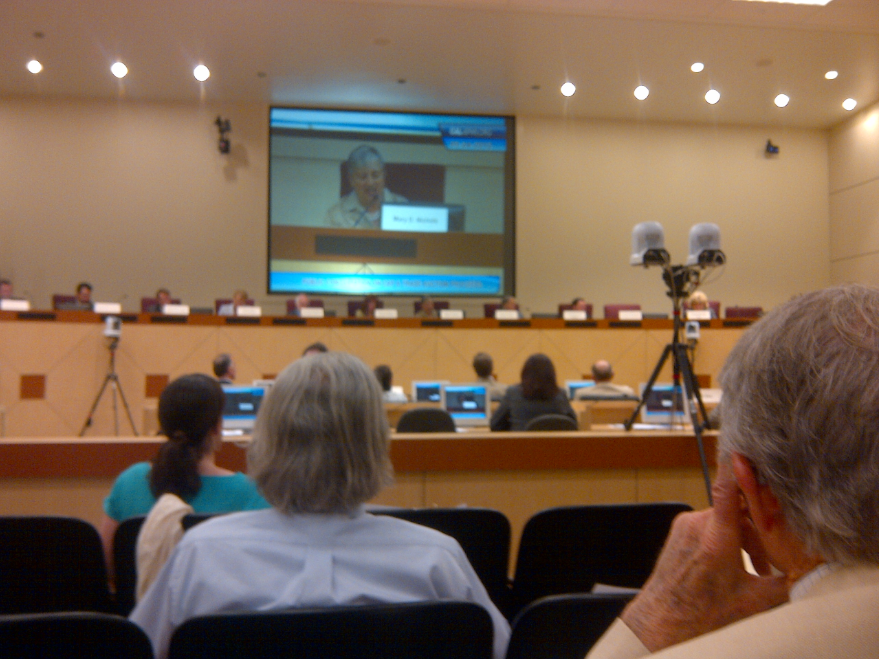
A CARB meeting on how to invest the $1-2BILLION in proceeds from the California Cap & Trade Auction. Two hundred plus “advocates” showed up for the public hearing. My guess is that the investment strategies were already decided by the time this hearing was held.
Frankly, I didn’t have the slightest idea of what I was getting into when I agreed to lead LACI. I knew I wanted to forge a new kind of public/private partnership to help build a cleantech economy, but it was a fuzzy concept at best. Almost one year later, the stats tell the story of what this takes…
- I’ve gone through 1500 business cards (I’ll save you the math, its 4+ cards for every day this past year)
- I’ve met/pitched LA’s Mayor, his entire staff, every General Manager that reports into him, three Deputy Mayors, three City Council Members, two County Supervisors, three Mayoral candidates, the City Controller, two B
 usiness Improvement District EDs, and most of the above’s staffs.
usiness Improvement District EDs, and most of the above’s staffs. - I’ve met/pitched two State Senators, the heads of the California Air Resources Board, the South Coast Air Resources Board, and various people from LA’s ports.
- I’ve held 35+ meetings with DC representatives, agency heads and their staffs. This is just one trip. I’m going back in two weeks.
- I’ve met/pitched the Los Angeles Chamber of Commerce, the Los Angeles Economic Development Corporation, the Los Angeles Business Council and every major university in the region (USC, UCLA, Caltech, JPL, Calstate LA/Pomona, and the Art Center College of Design)
- We’ve had the Chair of the White House’s Council on Environment Quality, the EPA Administrator, the Secretary of Labor, several Under/Assistant Secretaries of the Department of Energy, and assorted staff/leaders from the SBA and DOD to dinners and round tables at LACI
- And then there are the countless entrepreneurs, VCs, investment bankers, regular bankers, business leaders, academic professors & scientists, utility executives, Et. Al. that make up the Los Angeles innovation ecosystem.
I’m still not sure what a new kind of public/private partnership means, but I know a lot more about the public side of the equation than before. Since most of us never get the chance to interact with our government on a daily basis, I thought it might be interesting to share some observation on how “it” works. Here goes.
No matter how screwed up the system is, there are some pretty cool things and people in government. Perhaps because I live in the cleantech world, most of the people/staff in government that I come in contact with are dedicated, smart, highly educated and incredibly articulate. These folks just really, really care about what they do. This even goes for most of the politicians that I’ve met up close and personal. While there are certainly tons of bureaucrats and technocrats in this world, most of the folks I meet joined up because they care and want to make a difference. Which begs the question, then how did this whole thing get so f__ked up? Beats me: )
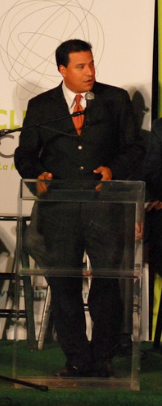
It’s sometimes complicated. This Council Member will never fully support LACI even though it’s in his district because the funds necessary to support LACI will be taken away from his favorite program — LA’s new Street Car program. The Street Cars will more directly impact the LOCAL business and residents that elected him. It’s just part of the game.
“All politics is local” is perhaps the truest thing that’s ever been said about how our government works. Heck, it might be the truest thing ever said about anything. Most politicians are elected to/from/by local areas, thus their primary focus is to deliver benefits to their constituents to get re-elected again and again and again and… To think a politician is going to support something that doesn’t immediately benefit their constituency is just naive. Hence, the job of anyone advocating anything to any elected official is to pitch the idea/program in the context of their local interests.
It took me a bit to get this. I often got the this guy is totally out to lunch look when I first started talking about our program in terms of the green economy, innovation, global competitiveness, environmental sustainability, etc. After a series of dull stares, I evolved the pitch to focus on local jobs, local tax revenue, local real estate appreciation, higher rent for local landlords, more restaurants, (and especially) more bars, etc. Ahh, now I started to get some head nods. I still need daily training in this area, but figuring out what local interest your program might help can be very useful: )
Politics is all about power (duh!). We all know that money=power, but how is power exercised in government? If you have power, you get to hire Staff (who have the time to become knowledgeable about a topic and lobby for/against something); to write an RFP /FFO (Request for Proposal/Federal Funding Opportunity) in a particular way that makes it harder/easier to win; to approve/disapprove or hold up a vote; to introduce someone who can do these things; and the king of all government power — the power to shape legislation and then the power to get it passed.
Those who have power, wield it. Those who don’t have it, want it or are submissive to it. It can be a tough day in the office if you fall into the latter categories which is where guys like me reside. Where you are in the power equation is reinforced by the next point.
Who says we don’t have royalty in this country? Walk into any government organization and its leaders are treated like royalty by those who need something from them (that would be almost everyone they meet with). They have special offices, a set protocol for meeting with them (for example, when meeting with someone in Congress, you immediately hand all the business cards from your group to the receptionist, who then staples them to a piece of paper, which then gets given to the Elected Official just before your meeting), body men, chiefs of staff, calendar secretaries (if in Congress, then there are DC calendar secretaries and district calendar secretaries), Field Reps, etc.,etc. The fawning over our elected/appointed officials applies to the lowest, most junior congressperson since once you’re in the Club, you’re in the Club and are treated as a potential Very Important Person (to be). All of this is unfortunate as this just tends to go to the elected official’s head — they really do believe all the good stuff people say about them: )
You have to be in it, to win it, and I’m not talking about the Lotto… Not advocating for your position within
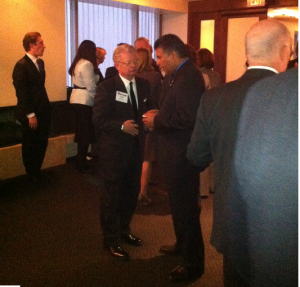
Making the case. The night before an important funding vote in LA, I was making our case at a cocktail reception in DC
government is akin to hoping to win a debate by sending in the answers. The next time you’re in DC, go to the Capital and walk the halls of a Senate and/or House office building. There will be tons of people hustling to meetings, it’s be tough to find a seat in the cafeterias, and you’ll be lucky to get a 15 minute meeting because all those people you passed in the hallway are doing what you should be doing — advocating for their interests.
A perfect example of this is the recent California Air Resources Board “public” hearing on how to spend the billions of dollars of proceeds from California’s new cap & trade law. This is an important meeting, but unknown by 99% of the business people and the public that could be affected.
The <1% that did show up are a force to be reckoned with. There were people advocating for the food processing industry, the manufacturing sector, the Forest Service, various water districts and companies, the x-thousand member construction union (did you know that just paving roads reduces pollution by 10%?… so we need more road construction money), the Latino community, the Black Chamber of Commerce (we need “shovel ready” projects), the 350 person strong Silicon Valley Leadership Group, the AQMD, the University of California, the Central Valley farmers Cooperative, etc. etc. All these people are in the game and they’re in it to win. Now multiply this hearing by 10,000X and you get an idea of what’s going on in DC.
Money gets raised for local politicians in the living rooms of the wealthiest and/or most active people in this country. This is actually a good thing, as for a couple hundred (or thousand) dollars, one gets to meet The Candidate up close and personal. You see who’s supporting them, listen to their questions and answers, and generally size-up The Candidate pretty intimately. And you get to see a bunch of cool houses along the way while sipping cheap wine and expensive h’orderves.
The biggest dog, or the princeliest Prince, are those who can raise money for the Have-Nots, i.e those candidates/politicians that for whatever reason can’t raise campaign money for themselves. Raising money for other candidates is The Currency that politicians use to form alliances. If you’re good at this, you’ll rise in the ranks of _____ (state senate/assembly, House of Representatives, Senate, etc.) Rising in the ranks means getting on committees that — you guessed it — can directly benefit your local constituencies! And the circle continues.
After a year of “hi, how are ya’s,” I keep thinking that maybe Rick Perry and Ron Paul are right. Maybe we should get rid of the Dept of Commerce and a couple of other agencies. They’re huge, (mostly) well-meaning bureaucracies that will never, ever be very efficient. Their systems are so ingrained that they can’t be fixed, leaving the only practical strategy for us advocates is to continue to game them through money and access.
The most often heard refrain today is that “our political system is broken!” DUH!! I didn’t study Poly Sci in school, and I’ve never spent a day as an elected or appointed official, but a few things stand out as good starting points for change after my experience. The next time that some candidate outlines their plan to fix DC (or Sacramento or…), see if it includes these essentials:
- Term limits for every elected official. Without this basic change, those in power will always be able to protect their power bases. The most often used argument against term limits… just when they learn their jobs, we toss them out! is patently ridiculous. I’ve never been given more than six weeks to get up to speed on any new job, so why can’t our elected officials figure it out in say… two, maybe three months.
- The elimination of the Seniority System in Congress. This is more corrupting than the unlimited employment that incumbency offers now. This system — that you get appointed to committees and chairmanship based on seniority — keeps the committee chairs,etc. in power forever no matter how competent they are. It seems to me that some amount of qualifying time on the job should be a prerequisite for positions of power (say a year), but after that these positions should be filled in some other manner.
- We need to weaken our two party system to improve it. This seems counter intuitive, but necessary to break the gridlock. The reason that most Republicans vote Republican and most Democrats vote Democratic isn’t because they have philosophical differences (which they do, of course), its because of the fear of party retribution if they don’t vote the party line. My thesis is if we’re going to fix the system, then we have to break many of the mechanisms that reward gridlock at all costs.
How come you left off the most important requirement for change: how money gets spent in elections? Because its too complicated and I don’t have any answers — I’ve only been on the job for a year!: ) On the local level, living room fund raisers work for me and I wish there was some way to make these much more prevalent. The national level is a whole other barrel of fish, and the subject for the 3000 Card Update.
I’ll leave you with a tip on how to spot a politician in a room full of people. It will be the person who’s perfectly coiffed:) Really! They have a level of dress that’s a step above the rest — perfect for the TV cameras (if they’re lucky) or photo op (more likely). See, the last year hasn’t been a waste. 🙂
Take care
Fred

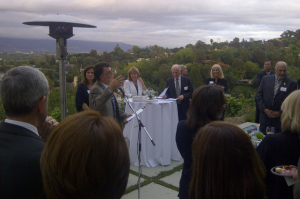




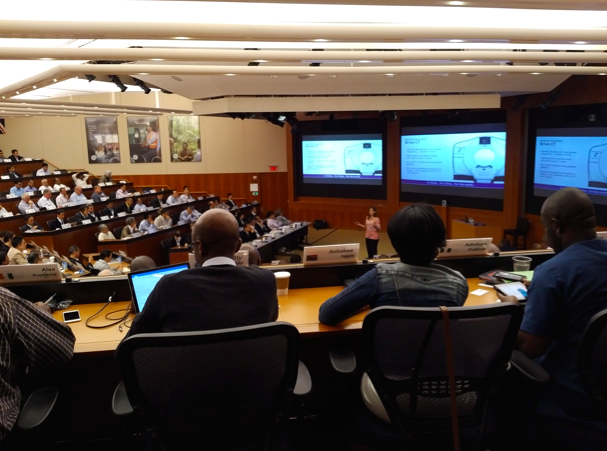

Where do you get the patience for this new world you are navigating?
For once you look taller than something!!! Wasn’t life in advertising much easier than this? All you did then was eat lunch on an expense account and travel to beautiful La Mirda. Ah, the good ole days…. we’re in Paris for the Spring ritual and my Madame will soon be “knighted” in Beaune as a Chevliar du Taste du Vin (Google it.) Wish you and KR were here to enjoy the wine, cheese and my excellent company …..Chucky
It’s a result of two things: (1) I believe in what I’m doing and think it can do some good (2) It’s a new world, which makes it interesting at first: )
Will they allow you to make a difference? Maybe, we need a third party. If we could talk Bloomberg into running or finance it. Maybe the Oracle of Omaha could make it work.
Keep doing it, have a nice trip to PV.
Thanks for the update, Fred. Here’s a real chance to think new thoughts. So go get ’em and do some good!
How soon do you anticipate fixing all of the thing’s that need fixing? Happy to help if you need us 😉
Seriously Fred, it is a new world and this country needs more passionate people like you to make change possible. Keep up the great work….Debbie and Dennis
If one of your little babies in the incubator program takes off, then the power would emerge (forgive the awful pun).